Students Of The National Institute Of Design Give A New Lease Of Life To Second-Hand Clothes And Scraps
The faculty at the National Institute of Design (NID) in Ahmedabad encourages students to innovate with the leftover fabric from not only within the campus but also outside it. It is a way to give a new meaning and conscience to old clothes.
-
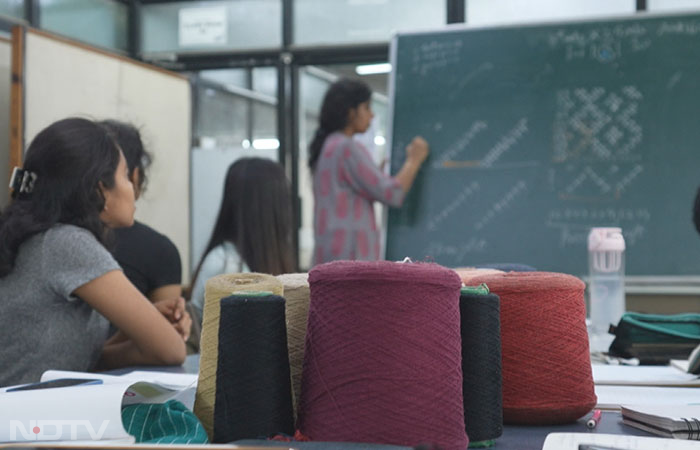 A classroom is a place of learning where ideas aren't restricted within the four walls. Every classroom is different like the National Institute of Design (NID) in Ahmedabad where one can find creativity and motivation from anywhere. Right within this world of ideas is the world of materials, in which the students engage at the level of design - thinking, questioning, and reimagining the ways in which we have come to know them. And one such space of exploration is the textile lab at NID.
A classroom is a place of learning where ideas aren't restricted within the four walls. Every classroom is different like the National Institute of Design (NID) in Ahmedabad where one can find creativity and motivation from anywhere. Right within this world of ideas is the world of materials, in which the students engage at the level of design - thinking, questioning, and reimagining the ways in which we have come to know them. And one such space of exploration is the textile lab at NID. -
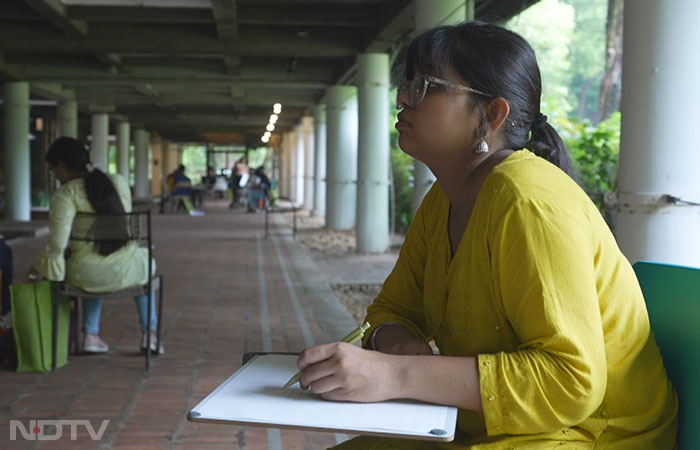 Each semester the students are given a design project for a span of six or eight to 10 weeks. This year, students were asked to work on something that really bothers them like overconsumption. And that's how this year's project brief was to make use of second-hand clothes and fabric waste or scraps of clothes.
Each semester the students are given a design project for a span of six or eight to 10 weeks. This year, students were asked to work on something that really bothers them like overconsumption. And that's how this year's project brief was to make use of second-hand clothes and fabric waste or scraps of clothes. -
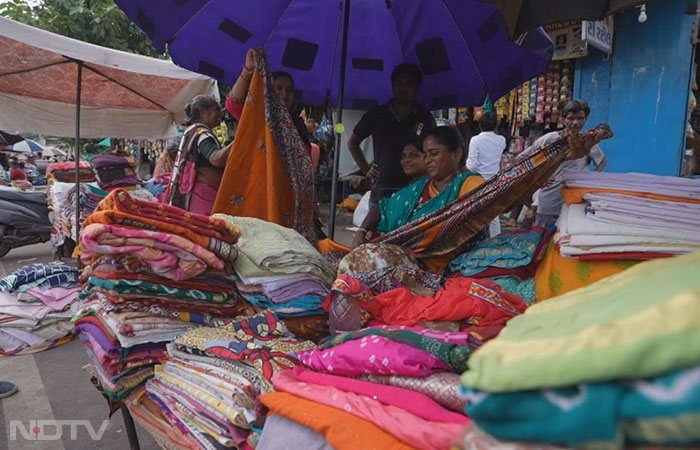 Setting out for their projects, the students ventured into Ahmedabad's Dilli Darwaja market, the city's largest market for second-hand clothes. It had all sorts of materials one would need but, it is an unorganised market. 'I was surprised that it was not even a proper market. It is just a stretch of road and vendors are sitting on the footpath,' said Isha Bapat, a student of Bachelor in Textile Design at NID, as she shared her experience.
Setting out for their projects, the students ventured into Ahmedabad's Dilli Darwaja market, the city's largest market for second-hand clothes. It had all sorts of materials one would need but, it is an unorganised market. 'I was surprised that it was not even a proper market. It is just a stretch of road and vendors are sitting on the footpath,' said Isha Bapat, a student of Bachelor in Textile Design at NID, as she shared her experience. -
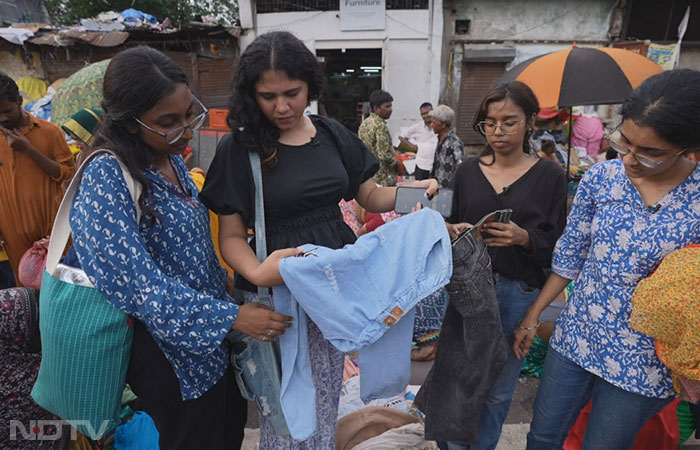 When working with second-hand clothes, one doesn't have many options. To find the right material for the design, one has to sift through a pile of clothes. But, students have learned their way through the market. Vishnupriya Narayanan, Faculty, Textile Design Discipline, NID said, the students have built contacts with the vendors and have become comfortable with uncertainty. "They know it's not like you go to a shop where you can match a blouse with your saree. The students are also concerned about the fact that these vendors don't have proper space and how they often get warnings from cops to either clear out the space or pay a fine", she added.
When working with second-hand clothes, one doesn't have many options. To find the right material for the design, one has to sift through a pile of clothes. But, students have learned their way through the market. Vishnupriya Narayanan, Faculty, Textile Design Discipline, NID said, the students have built contacts with the vendors and have become comfortable with uncertainty. "They know it's not like you go to a shop where you can match a blouse with your saree. The students are also concerned about the fact that these vendors don't have proper space and how they often get warnings from cops to either clear out the space or pay a fine", she added. -
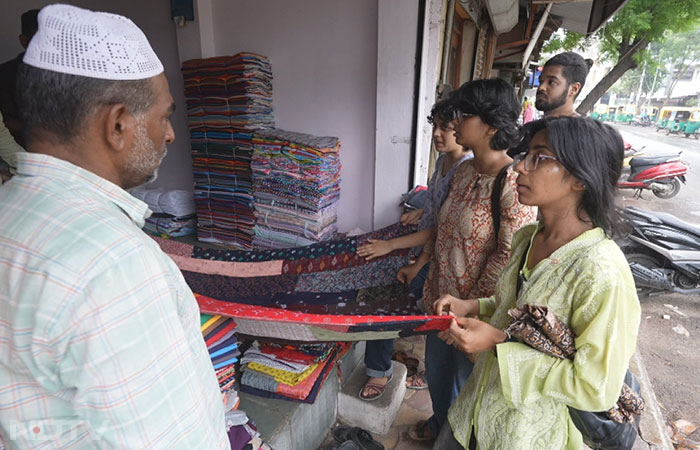 While Dilli Darwaja is historically one of the most prominent markets in Ahmedabad, offering students full-size garments to work with, there is another lane nearby, where another kind of textile scrap is sold. This is Dariyapur. On offer here - excess fabric from factories, from sarees to bedsheets, and also scraps of cloth called katran.
While Dilli Darwaja is historically one of the most prominent markets in Ahmedabad, offering students full-size garments to work with, there is another lane nearby, where another kind of textile scrap is sold. This is Dariyapur. On offer here - excess fabric from factories, from sarees to bedsheets, and also scraps of cloth called katran. -
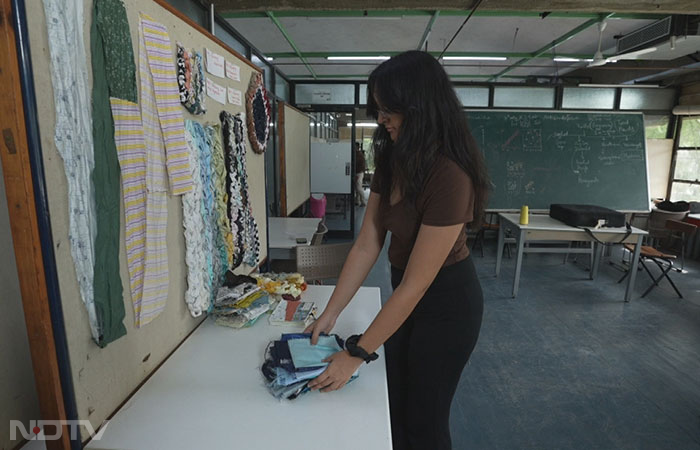 Using second-hand clothes doesn't mean buying scrap and putting them together. There are challenges involved like you don't really get to choose. Shruti Suresh Pawar, Bachelor in Textile Design student said, "We have limited choices when using second-hand clothes. We have to let the material direct us. People who opt for the patchwork technique look out for colours that will complement each other."
Using second-hand clothes doesn't mean buying scrap and putting them together. There are challenges involved like you don't really get to choose. Shruti Suresh Pawar, Bachelor in Textile Design student said, "We have limited choices when using second-hand clothes. We have to let the material direct us. People who opt for the patchwork technique look out for colours that will complement each other." -
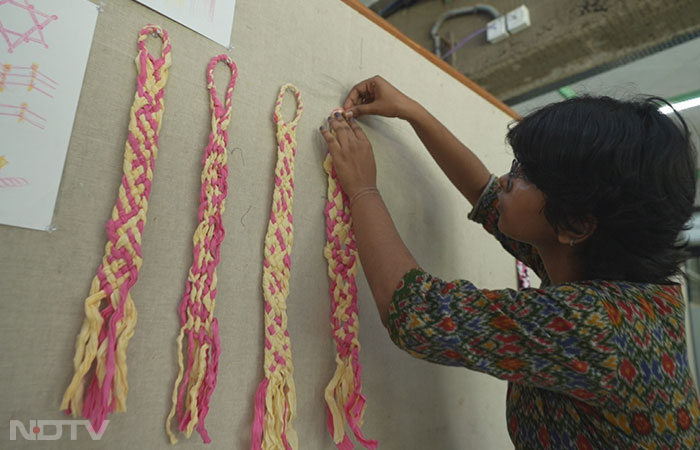 But what keeps these students going is the consciousness that they bring into their projects. Isha Bapat, one of the design students said, "For this particular project, we did go to the second-hand market to source the materials. It is about bringing in a consciousness that my generation I think already has. Because we are getting increasingly more interested in thrifting and second-hand clothing so, we already have that sustainable mindset and we try to bring it into our projects through ways of reusing and just minimalising waste and making sure that when we are using the material we are not wasting any of it."
But what keeps these students going is the consciousness that they bring into their projects. Isha Bapat, one of the design students said, "For this particular project, we did go to the second-hand market to source the materials. It is about bringing in a consciousness that my generation I think already has. Because we are getting increasingly more interested in thrifting and second-hand clothing so, we already have that sustainable mindset and we try to bring it into our projects through ways of reusing and just minimalising waste and making sure that when we are using the material we are not wasting any of it."
Advertisement
Advertisement
Advertisement
